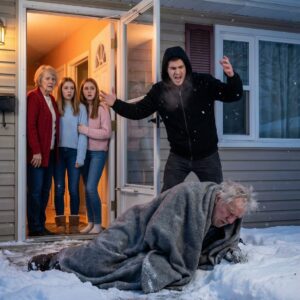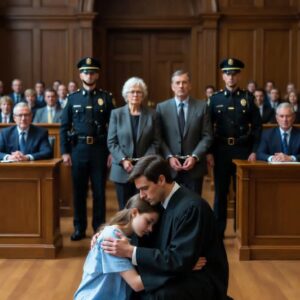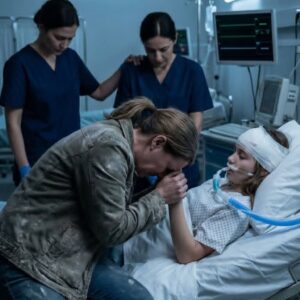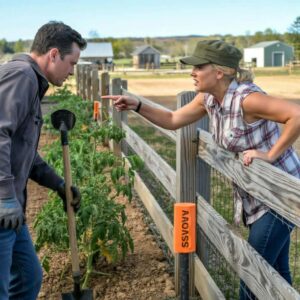That day, I was driving to kill my future. Not because I wanted to, but because my boyfriend Brandon had convinced me that otherwise we’d drown in debt. I was already sitting in my old car, tears streaming down my cheeks, when I reached for my bag to check the appointment one more time and realized I’d left my ID at home.
And if it weren’t for that stupid accident, if I hadn’t turned the car around and checked the mailbox, I would never have known that my childless great-aunt, whom I considered almost a myth, had prepared a completely different fate for me and my unborn child. One with no room for fear and despair. My name is Ashley, I’m 28 years old, and for the last two years, my life has felt like an endless treadmill.
Two jobs: cashier at the supermarket during the day, cleaning offices at night, a rented apartment on the outskirts where rusty water dripped from the faucet, and an eternal feeling of exhaustion so deep that sometimes I’d fall asleep fully clothed, unable to make it to bed. And there was Brandon beside me; we met three years ago, and back then he seemed reliable and strong. He spoke beautifully about the future, about how we’d overcome everything, how he’d find a good job and we’d live like normal people.
But time passed, and Brandon kept bouncing between temp gigs, blaming his failures on the economy, unfair bosses, or just a bad mood. I believed him, I pulled us both along, cooked dinners from scraps, and mended his only pair of jeans, hoping things would turn around soon. When I saw the two lines on the test, my first reaction was a quiet, almost frightened joy.
Finally, there’d be meaning in my gray life, a little ray of light. But that joy faded that same evening when I saw Brandon’s face. He didn’t yell, no.
He was a master of quiet, draining pressure. That evening, he sat across from me in the kitchen, took my hands in his, and started speaking in his soft, persuasive voice. «Ashley, honey, you know we can’t afford this.
Where would we put a kid right now? We’re buried in debt. Rent to pay, loans for the appliances. Do you want our baby growing up in poverty, watching his parents count every penny? Is that fair to him?» Each word was like a small, precise stab.
He painted pictures of our joyless future. A crying, hungry infant, me exhausted and aged, him broken by the unbearable burden. «Let’s get on our feet first,» he said, looking straight into my eyes.
«Buy our own place, I’ll find steady work, and then, then we’ll have kids—not one, but two, three, as many as you want. But now, honey, it’s just irresponsible. I’m saying this because I love you and I’m thinking of our future together.»
And I gave in. His logic seemed ironclad, and my timid hope felt foolish and selfish. The next week, I walked around in a fog.
Brandon surrounded me with fake care, bringing tea, letting me off night shifts, booking me at a private clinic himself so it would be quick and painless. That care suffocated me. I felt less like a loved woman and more like a problem to be solved fast.
That morning, he woke me earlier than usual. Coffee and a sandwich that wouldn’t go down were already on the table. «Eat up, you need your strength,» he said, laying money on the table.
I stared at those bills, and they felt like payment for betraying myself. The whole drive to the clinic, I was silent, gripping the wheel of my old car. Brandon didn’t come with me, claiming an urgent work meeting.
I knew he was lying; he just didn’t want to be there for it, didn’t want to see my tears or dirty his conscience. He wanted the result and to move on like before. Inside, everything went numb.
I was alone. Completely alone in the world. The clinic was in the city center, in a quiet old building.
I parked around the corner, turned off the engine, and sat for a few minutes, staring at nothing. Tears dripped onto my jeans again. I placed my hand on my belly.
There was life there. My tiny secret, unwanted by anyone but me. «Forgive me, baby,» I whispered into the void.
Gathering my last bit of will, I reached for the bag on the passenger seat. I needed to grab the folder with documents and tests. I opened the bag, rummaged, and found nothing.
My mind cleared slowly. The folder. The blue plastic one.
Where was it? I clearly remembered packing it last night: ID, insurance card, all the papers from the consultations. And I’d left it. Left it on the hall table.
First reaction: dull irritation at my own scatterbrain. How could I forget the most important thing? But right after that irritation came another wave, completely unexpected. A wave of relief.
So huge it took my breath away. I had a reason. I had a reprieve…
I turned the car so sharply the tires squealed. The drive home felt half as long. I wasn’t crying anymore.
I just drove, following some inner impulse. Thoughts tangled in my head. What would I tell the clinic? That I changed my mind? Or just reschedule? And what about Brandon? That thought was the heaviest.
I pictured his face again, his logical arguments, his quiet pressure. And for the first time in days, I felt not despair, but anger. Anger at him, at his weakness masked as care.
And at myself for letting him break me so easily. I pulled into our sleepy driveway and parked in the usual spot. I didn’t want to go up to the apartment.
That meant sinking back into hopelessness. Getting out of the car, I absently stuck my hand into our old, dented mailbox. Usually, it was just bills and junk mail.
But today, my fingers hit something thick and unusually heavy. I pulled out a large envelope of expensive cream paper. In calligraphic script, it had my address and name.
In the corner was a law firm’s stamp, and the sender’s name made me go cold. Matilda Hawthorne. My great-aunt.
A woman I hadn’t seen in almost 20 years and thought long gone from this world. I stood in the middle of the driveway, clutching this heavy, fancy envelope, unable to move. Matilda Hawthorne, my grandmother’s cousin.
In my memory, she was a vague, almost fairy-tale figure from deep childhood. A tall, stern woman with gray hair in a tight bun and piercing but not mean eyes—more sad. I’d seen her only once, when I was about seven, at my grandmother’s funeral.
She spoke to almost no one, kept to herself, and Mom whispered not to go near her, saying Aunt Matilda had a tough personality. And now, after 20 years, she appeared from nowhere in this letter from a law firm. My heart pounded in my throat, fingers chilled as if it were winter, not a warm fall day.
I slowly climbed the stairs but didn’t go into our apartment. I sat right on the cold steps in the hallway, like I did as a kid when I wanted to hide from the world. My hands shook so much I could barely tear the envelope.
The paper was thick, with watermarks, tearing with a noble crunch. Inside were two sheets. The first, printed on official letterhead with a seal at the bottom.
It was a notary’s notice, dry and formal. It stated that Hawthorne Matilda, my great-aunt, had passed away two weeks ago at age 89, and per her last will and testament, all her property—a three-bedroom apartment in the old city center, a country house with land, and all bank account funds—passed fully to me. I reread those lines several times, but my brain refused to process them.
This couldn’t be. Some mistake, a ridiculous joke. We never communicated; she didn’t even know I existed, I was sure.
Why me? I set aside the official sheet and took the second. It was handwritten in faded blue ink, in an angular script I vaguely remembered from a signature on an old card. It was her letter.
Hello, Ashley dear, it began. If you’re reading this, I’m already gone. Don’t grieve for me.
I’ve lived a long, though very lonely life. Forgive me for never seeking you out. After your grandmother’s death, my only kin, I walled myself off from the world.
I thought it would be easier. Now I see what self-deception that was. Old age isn’t scary for wrinkles, but for the silence in a house where no one awaits your call.
I know you’re going through a hard time now. Don’t ask how. Old lonely women have ways of hearing news about those they care for.
I know you’re strong; you’re our Hawthorne stock. But even the strongest need help sometimes. I couldn’t become a mother; that’s my greatest pain and mistake.
And I want my departure to be the start of your new life. I’m leaving you everything I have. It’s not much, but enough so you’ll never fear tomorrow.
I have just one request, not a condition, but an old woman’s dream. I know you’re carrying new life under your heart. Save it, please…
Give this child the chance I never had. And if it’s a girl, I’d be over the moon if you named her after me, Matilda, in my memory. Let at least one little Matilda in this world be happy.
Hugs, your great-aunt. I finished the letter and leaned my head against the cold, peeling hallway wall. Tears streamed down my cheeks, but these weren’t tears of despair and hopelessness like an hour ago in the car.
This was something else—a mix of shock, grief for a stranger who turned out to be family, and an overwhelming, dizzying sense of freedom. As if an unbearable weight I’d carried for years was lifted from my shoulders. Debts, loans, fear of not paying rent, humiliating work for pennies.
All that suddenly vanished, dissolved like a bad dream. I reread her handwritten lines again and again. «Save it, please.»
She knew. Somehow, this lonely old woman, shut in her city-center apartment, knew more about me than I thought. She knew my problems and my child.
And she didn’t judge, didn’t lecture; she just extended a hand from beyond. I placed my palm on my belly again. Little Matilda, my daughter.
In my memory flashed that one day I saw her. After the funeral, everyone gathered in Grandma’s small apartment. It was noisy, crowded, smelling of food and grief.
And Aunt Matilda sat in the corner, in an old chair, straight as a string, staring out the window. Seven-year-old me approached out of curiosity. She turned her head, her sad eyes examining me closely.
She didn’t smile, but her gaze warmed. Silently, she pulled from her antique purse a small, time-darkened silver spoon engraved with «M» and handed it to me. «For you,» she said in a quiet, creaky voice.
For your first tooth, even if late. Mom took it away later, saying it wasn’t right to accept gifts on such a day, and stashed it somewhere. But I remembered.
Remembered her dry, cool hand and the sense of something important, real. She’d remembered me all these years. Thought of me and in her final hour cared not for someone else, but for me and my unborn daughter.
The apartment door slammed, and Brandon appeared on the landing. He was in a good mood, whistling a tune. Seeing me on the steps with a tear-streaked face, he frowned, but his voice held no sympathy, only annoyance.
«What are you doing sitting here? I thought you’d be at the clinic by now. Something happen? Traffic?» He came closer, his gaze sliding to the envelope in my hands. «What’s that?» he asked, suspicion creeping in.
I stood silently, feeling everything inside freeze into ice. «I didn’t go,» I said quietly. «Forgot the documents.» Brandon rolled his eyes.
«Ashley, come on, we agreed, I set it all up, paid—I mean, gave you the money—what’s this childish behavior? You should’ve gone back and driven again, what were you waiting for?» His words no longer hurt. I looked at him as if seeing him for the first time. This handsome but weak man, so afraid of responsibility he’d convince me to do the worst thing in my life.
«I don’t need it anymore,» I said evenly and handed him the letter. Not the personal one, but the official notary notice. He snatched it with unconcealed irritation.
«What the…» he started and went silent. I watched his face. It was like frames changing in a movie.
First confusion, then disbelief. He squinted, rereading the first line. Then his eyes widened.
He scanned to the end, then back to the start. His mouth opened slightly. «Three-bedroom apartment, country house, all bank funds,» he whispered, disbelieving.
He looked up at me, and there was no joy for me, no sympathy for my relative’s death. His eyes burned with greed. «Is this… real?» he breathed.
I nodded silently. And then the transformation. Brandon’s face lit up with a wide, ecstatic smile.
He rushed to me, scooped me up, and spun me around the landing. «Ashley, honey, this is… this is a miracle! We’re rich! You get it, we’re rich!» He set me down and fixed his gaze on my belly. His eyes shone with mad delight.





